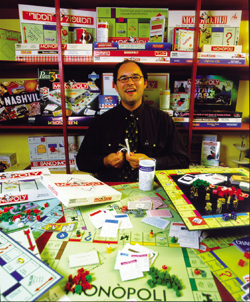Collective
efforts
>>
The
rules of the game
"The
chess board is the world," wrote 19th-century English scientist
and educator Thomas Henry Huxley, "the pieces are the phenomena
of the universe, the rules of the game are what we call the laws
of Nature."
Edwin
("Ned") Munger, SB'43, SM'48, PhD'51, has taken Huxley
to heart and assembled a small galaxy: a collection of 350 ethnic
chess sets from his travels to 150 countries. Some sets-like a
recent addition from the Orkney Islands off the northern coast
of Scotland and another from Niue, an island in the South Pacific-he
commissioned and then waited patiently while the artists labored
over their visions of a pawn or a king. Others he purchased ready-made,
both new and antique.

Each
has its own story, many of which are related in Munger's book
series Cultures, Chess & Art: A Collector's Odyssey across
Seven Continents (Mundial Press). A professor emeritus of African
studies at the California Institute of Technology, Munger says
that his first volume, on Sub-Saharan Africa, was an extension
of his life's work. At the moment he's at work on volume four:
Mongolia west through the "-stans" down to the Middle
East, India, and Sri Lanka.
Geography
happens also to be a passion (and a former concentration) for
Daniel G. Emberley, AB'82. His collection of 50 Monopoly games
includes Parker Brothers-licensed versions featuring the streets
of Paris, Milan, Prague, and Moscow. (Strangely, the Canadian
version is simply Atlantic City in French: le Parc Place.)
"They're a unique snapshot of each culture," says Emberley.
And like Munger's chess sets, "each one tells a story. For
instance," he continues, "the Hong Kong version was
available there until the Chinese takeover, when it was suddenly
only available through Harrod's in London." The Russian version
of the boxed capitalist propaganda was banned in the U.S.S.R.

Among
Emberley's board games are also Parker Brothers-licensed knockoffs
(National Parks, Star Wars), as well as at least 20 unauthorized
versions: Buffalopoly, Elvis-opoloy, and Emberley's favorite,
Monotony: The Game for Bored Housewives. What interests Emberley
is how financially irrelevant the 1930s concept has become: "You
can buy Boardwalk in Milan for the price of a slice of pizza."

![]()

